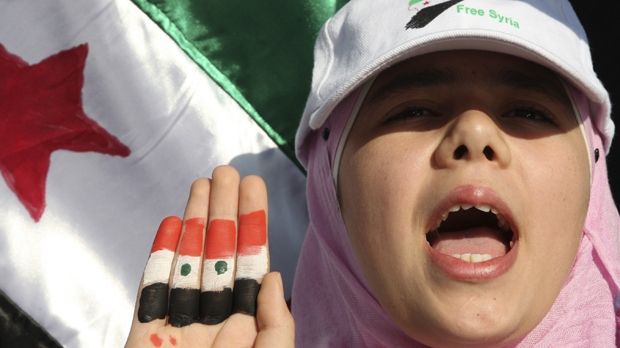Syrian tanks ‘shelling everything in sight’ in north
An activist in Syria tells Channel 4 News that the army are indiscriminately shelling villages surrounding the city of Jisr al-Shughour, as dozens more are killed in protests across the country.
Syrian state television announced that a military operation had started aimed at “armed groups, terrorist and criminal organisations” in the north-western city of Jisr al-Shughour near the Turkish border, prompting thousands to flee to Turkey and neighbouring villages.
An activist at a prominent protest group in Damascus told Channel 4 News that he had received reports that “maybe 3000 troops and at least 50 tanks” from the Syrian army’s elite 4th Division are surrounding Jisr al-Shughour and shelling neighbouring villages, but the shelling of the city itself had not yet started.
“Communication has been disrupted but we have received reports tanks are shelling everything in sight [in neighbouring villages], including in Maarat al-Numanit, it will be a massacre,” the activist who wished to remain anonymous said.
“We don’t know numbers yet, but we know too many have been killed and that it is difficult to get to the wounded,” he continued.

He added that although most of Jisr al-Shughour’s 50 000 inhabitants had fled, “thousands who are too poor to escape” remain.
The Syrian government had previously said it would take “firm and forceful” action in Jisr al-Shughour after it claimed 120 troops were killed and mutilated by “armed gangs” during multiple attacks. But activists and eyewitnesses say the officials were killed by a helicopter gunship because they refused to open fire on a funeral procession.
Refugees
Metin Corabatir, an officer at the UN’s refugee agency in Ankara – the UNHCR – told Channel 4 News that although the UNHCR did not have a presence on the border, he had been informed by officials that the total number of refugees escaping into Turkey was 3000, spread across 3 different camps.
“The number of people coming to Turkey is rising quickly, and I understand more locations are being identified to make new sites,” he said.
Despite Turkish authorities banning refugees from talking to the media, Corabatir was confident refugees were being treated well and that none had been turned away.
Turkey’s Prime Minister Erdogan has sharpened his tone against President Assad’s regime, saying it was committing “atrocities” against anti-government demonstrators, whilst promising to keep Turkey’s borders open.
“They are not acting in a humane manner. This is savagery,” he told State television, two days before parliamentary elections in the country.
Nationwide unrest
The Syrian opposition group the Local Coordination Committees said 28 demonstrators had been killed at more than 60 protests across the country.
Among the dead were two protesters in Deraa, four in Damascus, five from Lattakia, and 11 from Idlib province in the north-west.
Syrian lobbyist Wissam Tarif – the Director of the human rights group Insan – told Channel 4 News that the opposition movement had taken time to organise itself but was now gaining increased momentum.
“We are seeing more and more people out on the street, and we are seeing more army deserters. In addition to that, we have not seen mass protests in the key cities of Damascus and Aleppo. Once these cities of millions rise up, we will see change,” he said.
Read more: 77 killed during Syrian unrest
The Syrian national who was in the Hague meeting exiled opposition figures said he had documented 38 cases where police stations and barracks had been abandoned to apparently entice protesters to take up arms.
“The regime is trying to this into a violent uprising, but the people are rising up peacefully. There is no political will for violence, and there is absolutely no appetite for sectarian conflict,” he said.
“The traditional opposition have been discredited for keeping too quiet during the early days of the protests, but now the four main grassroot groups are united, even the political groups say they no time for ideology at a time like this,” he added.
UN Vote
The UN Security Council debated a draft resolution on Wednesday condemning Syria’s actions.
The motion – put forward by Britain, France, Germany, and Portugal – calls for an end to the Syrian regime’s systematic violation of human rights, but stops short of authorising concrete military action.
Russia and China, which both hold vetoes, have made clear they dislike the idea of council involvement, which they say could help to destabilise a strategic Middle Eastern country.
